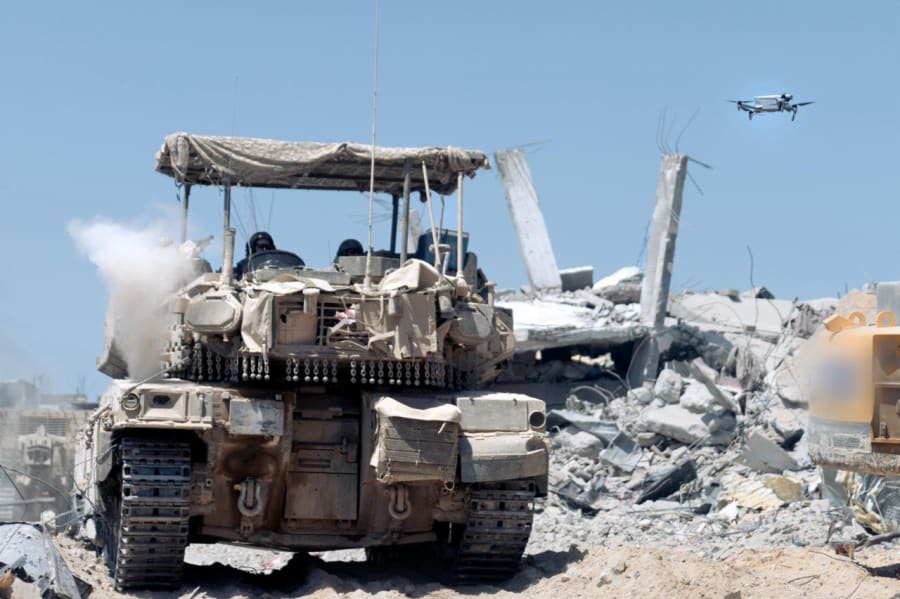No fairytale ending to Gaza war: After October 7, there is no going back

Whichever side you are on, one reality is inescapable: there will be no fairytale ending to the war with Hamas in Gaza.
That harsh truth is devastating for the families of hostages, for soldiers who have fought for hundreds of days, for residents of southern Israel whose homes were destroyed and loved ones murdered, and for the nation as a whole. Yet, the sooner Israel accepts this reality, the sooner the war can end – and the sooner the country can begin the painful but vital work of healing and rebuilding stronger than before.
The first reality is that Hamas will still exist whenever Israel stops fighting in Gaza – even if Israel succeeds in destroying its terror capabilities.
"The ideology does not disappear," explained Col. (Ret.) Miri Eisin, a senior fellow at the International Institute for Counterterrorism at Reichman University. "That ideology, which is a political Islamist, even a jihadi view that Israel cannot exist … is still going to be there. Hamas was founded by Palestinians in the Gaza Strip, and it's still going to be in the Gaza Strip, in the West Bank, and in other places."
In other words, Israel must stop claiming that Hamas will be "destroyed" and instead clarify that what will be destroyed are Hamas's terror capabilities and its ability to rule Gaza. That is not a happily-ever-after ending.
"We need to face the fact," Eisin stressed in a call with ALL ISRAEL NEWS, "that we are going to wake up tomorrow morning and the war will be over and there will still be people calling themselves Hamas who are going to continue to call for our destruction."
For Israel, victory will mean reducing Hamas to the point where only lone wolves or small groups can act on its vision – not an organized, governing force.
The second reality is that not all of the 48 dead and alive hostages in Gaza are coming home.
Even if Hamas were to agree to a deal tomorrow, it is unrealistic to believe that every hostage would return. Hamas itself reportedly admitted in a Saudi newspaper that it does not know where every hostage is. Beyond that admission lies the harsher truth: Hamas will not willingly give up all of its bargaining chips. To do so would strip the group of its primary leverage against Israel and expose it to total destruction.
This means Israel and the international community must face a painful reality: there may never be a "complete" resolution, no matter the negotiations or international pressure.
As Eisin explained, when it comes to the hostages, Hamas is in a win-win situation. If they keep hostages alive, they give families – and the nation – hope, which they then weaponize to terrorize Israel.
For families, there is a world of difference between bringing home a body for burial and bringing home a living person. Yet even now, when officials speak of around 20 living hostages, these are individuals who appeared alive when captured on October 7. In many cases, there have been no signs of life since.
For Hamas, the psychological impact is even greater if they kill hostages and blame Israel. They do not need to broadcast an execution; instead, they can claim a hostage died because of Israeli military action, displaying a body and pointing to a hospital, mosque, or school that was attacked. The message: Israel kills its own. Tragically, inside Israel, many will accept that narrative – a reflection of Hamas's success in deepening internal divisions.
"I want every single hostage home right now," Eisin said. "If I were making the decisions, I would say bring them back, and afterwards we'll kill Hamas. But it doesn't work that way. If you don't pressure Hamas, they won't give them back. When you pressure Hamas, they can execute a hostage, say that we killed them, and blame us."
It is, to say the least, an excruciating choice.
For Israel, true victory will be a reunified nation that stands firmly behind the hostage families, no matter what the ultimate reality may be for their loved ones.
Victory will also mean re-legitimizing Israel.
For decades, the false narrative of Israel as a colonialist, apartheid oppressor has gained traction, primarily fueled by the Palestinians’ propaganda machine in the West. But in the last 23 months, the danger has deepened: Hamas itself has been legitimized, its terrorist identity blurred until it has become synonymous with Palestinians and their suffering.
Israel's war now must be to change that narrative.
And Israelis must also understand: the "day after" is not October 6, 2023.
October 7 happened, and it changed the country forever. When the war ends, the task will not only be securing people and borders. It will be about healing the trauma, rebuilding the economy, and unifying a fractured people – so that the nation of Israel can truly rise again.
.jpg)
Maayan Hoffman is a veteran American-Israeli journalist. She is the Executive Editor of ILTV News and formerly served as News Editor and Deputy CEO of The Jerusalem Post, where she launched the paper’s Christian World portal. She is also a correspondent for The Media Line and host of the Hadassah on Call podcast.
You might also like to read this:

















